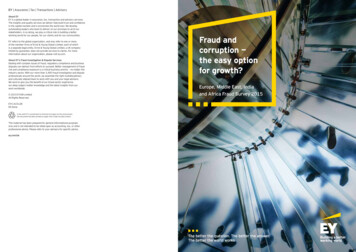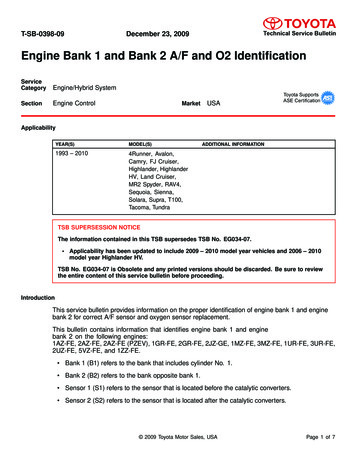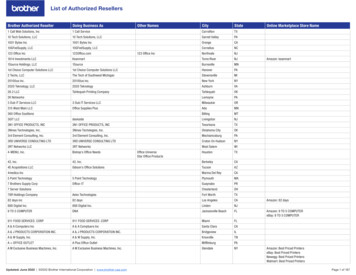
Transcription
EY Assurance Tax Transactions AdvisoryAbout EYEY is a global leader in assurance, tax, transaction and advisory services.The insights and quality services we deliver help build trust and confidencein the capital markets and in economies the world over. We developoutstanding leaders who team to deliver on our promises to all of ourstakeholders. In so doing, we play a critical role in building a betterworking world for our people, for our clients and for our communities.EY refers to the global organization, and may refer to one or more,of the member firms of Ernst & Young Global Limited, each of whichis a separate legal entity. Ernst & Young Global Limited, a UK companylimited by guarantee, does not provide services to clients. For moreinformation about our organization, please visit ey.com.About EY’s Fraud Investigation & Dispute ServicesDealing with complex issues of fraud, regulatory compliance and businessdisputes can detract from efforts to succeed. Better management of fraudrisk and compliance exposure is a critical business priority — no matter theindustry sector. With our more than 3,400 fraud investigation and disputeprofessionals around the world, we assemble the right multidisciplinaryand culturally aligned team to work with you and your legal advisors.We work to give you the benefit of our broad sector experience,our deep subject matter knowledge and the latest insights from ourwork worldwide. 2015 EYGM LimitedAll Rights Reserved.EYG AU3128ED NoneIn line with EY’s commitment to minimize its impact on the environment,this document has been printed on paper with a high recycled content.This material has been prepared for general informational purposesonly and is not intended to be relied upon as accounting, tax, or otherprofessional advice. Please refer to your advisors for specific advice.ey.com/ukFraud andcorruption —the easy optionfor growth?Europe, Middle East, Indiaand Africa Fraud Survey 2015
Fraud and corruption — the easy option for growth?Europe, Middle East, India and Africa Fraud Survey 2015Fraud and corruption - the easy option for growth?Europe, Middle East, India and Africa Fraud Survey 2015ContentsForewordForeword 1Executive summary 2Volatility — a driver of corruption? 4 Does compliance enable growth? 8Financial services — under pressure from all sides 10Protecting sustainable business value 14Get with the program —improving the corporate response 16Leadership engagement is critical 18Survey approach 20Detailed results 21Contact information 25The cost of unethical behavior has neverbeen higher. Headlines such as “Bank paysrecord fine,” “US 2.6 billion settlement agreed”and “ 1 billion bail ordered” continue to makethe front pages of the financial press.The results show that businesses that have experienced revenuegrowth in the last two years are more likely to be seen as ethical bytheir employees, not only at head office but also across operationsin different countries. We also see that these businesses are morelikely to have effective compliance policies and procedures in placeand management is more engaged in monitoring compliance andrisk mitigation.Businesses are facing increasingly complex challenges to growth —market volatility, geopolitical instability, oil shocks and economicsanctions. But businesses are also under tremendous pressure toachieve this growth. In such circumstances, is unethical growththe easy option for growth? The results of our survey of 3,800respondents across 38 countries continue to show the significantrisk of individuals acting unethically. Respondents display the humantendency towards rationalization of behaviors, ethical or not.Do ethical conduct and a strong focus on compliance drivegrowth? These results tell us that good compliance is not a barrierto growth or a burden to increased profitability. It is, in our view,a requirement for sustained success.The risks of fraud, bribery and corruption remain widespreadand we continue to see businesses failing to mitigate theserisks effectively. More than half of all respondents, and 61% of respondentsin rapid-growth markets, believe that bribery and corruptionis widespread in their country. And yet 42% of respondentsreport that their company does not have an anti-bribery policyin place or didn’t know if there was one. Thirty-seven percent of respondents believe that the financialperformance of businesses in their markets is often overstated.And yet 20% of respondents feel their management team athead office does not understand the business environmentthat they face.We know that tip-offs are the most common way that fraud,bribery and corruption are uncovered. And yet almost aquarter of respondents say their company does not havea whistle-blowing hotline.We know that training is a critical method for communicatinganti-corruption policies to employees, and yet over a third ofrespondents have not been trained.Given the interdependencies in today’s markets, it is extremelylikely that somewhere you are doing business with a companythat is not effectively managing the risks of fraud, corruptionand other unethical business conduct.That’s risky business. The pressure to achieve growth anddevelop new revenue opportunities is driving teams andindividuals toward these risks and pushing them to unethicalbehavior themselves.Is unethical behavior the inevitable outcome of pressure to achievegrowth in an extremely challenging market? Our survey resultssuggest not. Good compliance, and good ethical standards, can —and in fact do — go hand in hand with revenue growth.Financial services organizations in particular know the costof non‑compliance. But what our survey tells us about theseorganizations is that they are responding. They have investedin compliance and our results show that this investment is havinga positive effect. The survey responses suggest that thesecompanies are doing a better job at establishing anti-briberypolicies and are benefiting from strong senior managementcommitment to ethical standards.The commitment of senior leadership remains the most criticalfactor in changing an organization’s culture. It has becomecommon to talk about tone through the middle — but seniormanagement still has much to do. Our results show that theyoverestimate their impact in terms of how effectively they arecommunicating the importance of high ethical standards.An effective and sustainable integrity and compliance programrequires significant and sustained commitment from the top.Financial services organizations have shown how change can beinitiated, but these businesses also know how much investmenthas been required to achieve this.For most businesses, the challenging economic market conditionsthey face are unlikely to change significantly in the near future.Uncertainty caused by political developments — including electionsin key markets as well as conflict and social unrest — will continueto present a challenge. Sanctions on some countries may be lifted,but doing business in these jurisdictions will be complicated andrisky. Meanwhile, regulators and enforcement agencies are lookingto secure more resources and are cooperating across borders totake action against businesses that have achieved growth throughfraud or corruption. Operating in the grey areas of ethical businessconduct might be tempting for some. However, it is not a strategyfor delivering sustainable growth.We hope that this study contributes to further dialogue onthese important matters, and we thank all of the respondentsfor their contributions.David StulbGlobal LeaderFraud Investigation & Dispute Services1
Fraud and corruption — the easy option for growth?Europe, Middle East, India and Africa Fraud Survey 2015Fraud and corruption — the easy option for growth?Europe, Middle East, India and Africa Fraud Survey 2015Executive summaryOur survey of 3,800 respondents across 38countries confirms that the current businessenvironment is presenting significant challenges.The impact of market volatility has beencompounded by geopolitical instability and bigdrops in the oil price. Businesses are facing morecomplex restrictions on the way in which theydo business with sanction regimes changing.Complex risks — such as cyber crime — have thepotential to significantly disrupt operations.Nonetheless, our survey results show that most businesses are stillexpected to deliver new revenue growth. The question is — whatrisks are businesses willing to take to achieve this growth?31%of respondents agreethat management is underincreased pressure to expandinto higher risk markets.Fraud and corruption — the easy optionfor growth?Another specific concern highlighted by our results is that therisk of unethical practices is higher in recently created businessunits, irrespective of the market. When asked whether offeringcash payments is justifiable to help a business survive, newbusiness unit respondents are more than 50% more likely to agree,compared with respondents from longer-standing business units.Growing companies are more than three timesas likely as those with decreasing revenueto believe that regulatory activity has hada positive impact on ethical standards.Achieving growth and managing risksThe results of our survey send a clear message: ethical business andgood compliance go hand in hand with growth.Some still see compliance as a burden — one-fifth think followinganti-bribery policies very closely would harm their competitiveness.The results, however, show a clear correlation between companiesthat have experienced revenue growth and those that are seenby respondents as being “ethical.”Respondents that report revenue growth in their business in thepast two years are more likely than those from businesses that havereported decreased revenue to:Rapid-growth markets continue to be seen as a route to additionalrevenues. But in these markets, bribery and corruption remaina significant risk. Sixty-one percent of respondents in thesemarkets feel that corruption is widespread. Our results also show asignificant minority are able to justify unethical behavior — such asoffering cash payments and gifts — to help their business survive. Rate their company’s ethical standards as “good”Many respondents remain willing to take actions that couldresult in fraud. Thirty-seven percent of respondents agreethat companies in their country often report their financialperformance as better than it is.Respondents that report revenue growth in their business in thepast two years are more likely than those that report decreasedrevenue to say that their businesses have effective compliancepolicies and procedures in place. According to the results, they are: Twelve percent say requesting suppliers delay invoicing canbe justified. More likely to have an anti-bribery policy and code of conductand their staff are more likely to have attended anti‑briberytraining Fourteen percent say booking revenue from rebates withsuppliers early can be justified. Twenty-seven percent say negotiating retrospective rebateswith suppliers can be justified.More than one in five senior management respondents wereaware of the early recognition of revenue in the last 12 months.The same proportion had heard of underreporting of costs in theircompany during the last 12 months.2 Be confident that operations in different countries meet thesame ethical standards Believe that regulatory activity in their sector has had apositive impact on both ethical standards and their results More likely to have clear penalties for violating anti-bribery oranti-corruption (ABAC) policies Significantly more likely to be perceived as likely to supportpeople reporting fraud or corruptionThe results confirm our view that, far from being a barrier togrowth, effective compliance is a requirement for sustained success.Good practice isn’t spreading fastIf good compliance is a requirement for sustained success,what does it look like?Policies are a starting point. But 42% of respondents say that theircompany does not have anti-bribery policies or they are unaware ofthem. Even in developed markets, this result is 41% — very high givenhow much emphasis has been placed on policies by regulators andother stakeholders. On the positive side, where policies are in place,91% say that senior management has strongly communicated itscommitment to them.Anti-bribery training is a critical method for communicatingexpectations to employees. So it should be concerning that 37%of respondents have not received any. When training does happenit seems to be effective: almost three-quarters of the respondentswho attended training found it useful for their role.42%of respondents say they don’t thinktheir company has an ABAC policy ordon’t know if such a policy is in place.Moving beyond the basicsOnly half of respondents feel their management team at head officeunderstand the business environment that they face. This can resultin unrealistic expectations and pressure. Simple steps — such assite visits — can help. But less than half of respondents report thatmembers of the management team visit local facilities at leastonce every six months.The importance of other communication channels such aswhistle-blowing hotlines is therefore clear. Yet almost a quarter ofrespondents say their company does not have such a reportingchannel. Of the respondents who said their companies have ahotline, 42% think that a report is always followed up.Our results also reflect the fact that the financial services sector isunder greater regulatory and public scrutiny. Financial institutionshave been more active in their compliance efforts than businessesin other sectors — but that there is still more for them to do.Figure 1Senior management engagement key to cultureAre confident that head office managementobtains the right level of data to assessthe reliability of their business unit'sfinancial results72%Say senior management has stronglycommunicated its commitmentto ABAC policies28%Say that head office management understandthe business environment that they faceSay senior management frequentlycommunicate about the importance ofmaintaining high ethical standards andbehaviour when conducting business86%39%66%25%61%18%Respondents who rate their company's ethical standards as very goodRespondents who rate their company's ethical standards as poorBase: Respondents who rate their company’s ethical standards as very good (999); Respondents who ratetheir company’s ethical standards as poor (554)Overall, this year’s survey results deliver a strong message ofsupport for those performing compliance-related roles. Thereare several examples of good practice — such as the usefulnessof anti-bribery training.Yet, an effective and sustainable integrity and complianceprogram requires significant investment. The responses fromindividuals in the financial services sector, for example, showthis investment can move organizations in the right direction,but respondents in these businesses also know how muchinvestment has been required to achieve this. For boards andshareholders, the message is clear: good compliance is not abarrier to growth. Nor is it optional. In the current environment,it is a critical component to sustain success for the organization,its employees and shareholders.44%30%44% of senior managementrespondents said they frequentlycommunicate the importance ofhigh ethical standards but only30% of other employees agree.Commitment of leadership critical to changeManagement clearly has a fundamental role in bringingabout change.What we see in the results is that senior managers may beoverestimating their impact. The results suggest that seniormanagers think they are better than they actually are atcommunicating the importance of high ethical standards.Forty‑four percent of senior management respondents saythey frequently communicate this, but only 30% of otheremployees agree.The future business environment is likely to be even tougher —with further uncertainty resulting from political developmentsand shifting economic sanctions. This could drive fraudulent andcorrupt behavior, but as regulatory enforcement increases, thecost of such behavior will be even higher. Effective compliancewill be fundamental to achieving sustainable business growth.3
Fraud and corruption - the easy option for growth?Europe, Middle East, India and Africa Fraud Survey 2015Fraud and corruption - the easy option for growth?Europe, Middle East, India and Africa Fraud Survey 2015Volatility — a driver of corruption?For many businesses, optimism arising fromeconomic recovery has been overshadowed bythe negative effects of volatility and uncertainty.For many companies, increased pressure onmargins and balance sheets has resulted froma collapsed oil price and geopolitical factors,including economic sanctions and continuedconcerns over the stability of the Eurozone.In this environment, companies are still expected to deliversignificant revenue growth.Bribery and corruption meanwhile remains a significant risk,especially in rapid-growth markets, where 61% of respondentssee corruption as widespread. Fraud is an ongoing challenge,with 37% of respondents believing that the financial performanceof businesses in their markets is often overstated — and costpressures are coming from all directions.Growth — was everyone too optimistic?Our survey shows that, for a majority of respondents,economic growth has been slower than expected. Almost60% of respondents identify this slower-than-expected rateas challenging their specific business’s growth or success.% appliesDeveloped Rapid-growthPolitical instability in someof the countries we trade inUncertainty about our ability to trade dueto economic sanctions or export controls58%32%24%US perbarrelOur results also highlight a specific concern regarding newbusiness units. The pressure on these businesses to delivergrowth is intense.10050May 2013546225412030Q: Are any of the following increasing the challenges for the growth or success of yourbusiness?Base: All respondents (3,800); Developed (1,600); Rapid-growth (1,100)There are also several other strategic risks that are presentingchallenges to businesses: One-third of respondents (41% in rapid-growth markets)identify political instability as increasing the challenges. A quarter of respondents identify uncertainty about theirability to trade due to economic sanctions or export controlsas increasing the challenges.May 2014May 2015These new business units appear more likely to consider briberyan acceptable response to this pressure. When asked whetheroffering cash payments is justifiable to help a business survive,new business unit respondents are more than 50% more likelyto agree, compared with respondents from longer-standingbusiness units.Source: Europe Brent Spot Price FOB data, from US Energy Information AdministrationFigure 4New business units — greater risk?Deliver . or elseNegative financial performance comparedto plan is not shared in an open andtransparent way with head office managementSenior management is often working to forecasts based ona stable operating environment and optimistic expectationsof future growth. In many cases, targets are unachievable.With nearly 60% of managers under increased pressure to identifynew revenue opportunities, the options for growth may be hardto find. Continued pressure could result in actions that exposebusinesses to significant fraud and bribery risks.57%Figure 2Slower-than-expected economic growthSlower economic growththan expected in our countryFigure 3Collapsed oil price20%25%Offering personal gifts can bejustified if it helps a business survive17%25%Offering cash payments can bejustified if it helps a business survive15%22%Offering entertainment can bejustified if it helps a business surviveof respondents agreethat managers are underincreased pressure to createnew revenue opportunities.New businesses — new risksInvestment in new and growing markets is an obvious solutionto the pressure for new revenue.31%26%of respondents agreethat management is underincreased pressure to expandinto higher risk markets.Yet our respondents in these markets are also experiencingslower-than-expected growth. For example, 75% of respondentsin Africa acknowledge slower-than-expected economic growthas a challenge.Business units createdin the last two years15%Business units createdover two years agoBase: All respondents (3,800); Business units created in last two years (936); Business units created overtwo years ago (2,802)India — increased regulationmay not dampen growthRegulation in India is on the rise. Recent regulatorychanges include:The Companies Act 2013, aimed at creating abetter business environment with robust corporategovernance standards.The Lokpal Act, which received the President’sassent in January 2014, created an independententity to investigate allegations of corruption amonggovernment officials.Corporate governance norms for listed companies outlinedby the Securities and Exchange Board of India, includingmaking a whistle-blowing policy mandatory.More than 60% of respondents in India agree that regulatoryactivity in their sector has had a positive impact on ethicalstandards. Improvements have been reflected in TransparencyInternational’s 2014 Corruption Perceptions Index in whichIndia moved up nine places to rank 85th.Yet this increased regulation does not appear to havedampened growth. India has continued to experiencesignificant growth.5%Adding to this concern is the risk that poor results are less likelyto be reported by new business units — and that unethical practicesare going unnoticed: Twenty-six percent of respondents from new business unitsstate that negative financial performance is not shared withhead office in an open and transparent way.89%96% Twenty-one percent of respondents agree that unethicalpractices in their business often go unnoticed by head office.21%of respondents agree thatunethical practices often gounnoticed by head office.average growth since 2012 (slightly under2012 forecasts for the same period of over5.5%)1. Growth in the fiscal year 2015-16is expected to be 7.5%2.of respondents in India reported that revenuehad increased over the last two years.of respondents in India were optimisticabout India growth opportunities.Source: International Monetary Fund, World Economic Outlook DatabaseSource: World Bank Group, India Development Update, April 201512 The sharp decline in oil prices — of more than 40% betweenMay 2014 and May 2015 — has created both winners andlosers, and for countries and sectors heavily dependenton oil revenue, the negative impact has been huge.45
Fraud and corruption - the easy option for growth?Europe, Middle East, India and Africa Fraud Survey 2015Fraud and corruption - the easy option for growth?Europe, Middle East, India and Africa Fraud Survey 2015Corruption still widespread, despiteslight decrease Twelve percent say requesting suppliers delay invoicing canbe justified (16% in rapid-growth markets).Some good news: there has been a decrease in the proportion ofrespondents agreeing that bribery and corruption is widespreadin their country (2015: 51% vs. 2013: 57%). More than half of thecountries surveyed show a decrease. Fourteen percent say booking revenue from rebates withsuppliers early can be justified (23% in rapid-growth markets).Yet overall, there remains a majority of respondents agreeingthat bribery and corruption is widespread in their country, and inrapid‑growth markets 61% see corrupt practices happening widely.This is not just a theoretical risk. Our survey shows thatmanipulation of results is actually occurring within businesses.More than one in five senior management respondents wereaware of early recognition of revenue in their company in the last12 months. The same proportion had heard of underreporting ofcosts in their company during the last 12 months.Fraud risks remain despite high-profile casesHigh-profile cases of financial misstatement and criminalinvestigations into accounting irregularities do not appearto have resulted in any reduction in the risks of fraud. Twenty-seven percent say negotiating retrospective rebateswith suppliers can be justified (39% in rapid-growth markets).Thirty-seven percent of respondentsagree that companies in theircountry often report their financialperformance as better than it is.Our survey confirms that some employees are willingto misstate financial information. Thirty-seven percentof respondents agree that companies in their countryoften report their financial performance as better thanit is. Over 150 respondents to our survey stated thatmisstating financial performance can be justified, buteven more appear willing to take actions that could resultin financial statement manipulation:Our results highlight the challenges in doing business in all markets — fraud, bribery and corruption are widespread across geographies.Yet, there are differences in the ways in which these risks manifest themselves in different countries. For example, our results suggestthat in Russia employees are more likely to pay cash bribes than to offer gifts, whereas in India gifts are more likely. Businesses needto understand these nuances in order to implement effective integrity and compliance programs.Figure 6Fraud, bribery and corruption across Europe, Middle East, India and AfricaCzech RepublicSpain69%Bribery/corruptpracticeshappen widely34%Offering gifts towin business isjustifiable to helpa business survive16%Cash payments towin business arejustifiable to helpa business survive56%Companies oftenreport financialperformancebetter than it is61%Bribery/corruptpracticeshappen widely16%Offering gifts towin business isjustifiable to helpa business survive6%Cash payments towin business arejustifiable to helpa business survive29%Companies oftenreport financialperformancebetter than it isRussia60%IndiaBribery/corruptpracticeshappen widely9%Offering gifts towin business isjustifiable to helpa business survive16%Cash payments towin business arejustifiable to helpa business survive41%Companies oftenreport financialperformancebetter than it is80%Bribery/corruptpracticeshappen widely52%Offering gifts towin business isjustifiable to helpa business survive27%Cash payments towin business arejustifiable to helpa business survive59%Companies oftenreport financialperformancebetter than it isFigure 5Manipulating results%Negotiating retrospective rebates, bonusesor discounts from suppliers14%DevelopedRapid-growthSenior management92428Revenues being recorded before they shouldbe to meet short-term financial targets10%61623Underreporting of costs incurred to meetshort-term financial budgets9%614225141918112Customers being required to buy unnecessarystock to meet short-term sales targetsDon't knowAt least one of the above, including "don't know"8%15%43%365456Nigeria72%31%Offering gifts towin business isjustifiable to helpa business survive21%Cash payments towin business arejustifiable to helpa business survive47%Companies oftenreport financialperformancebetter than it isQ: Which, if any, of the following have you heard of happening at your company in the last 12 months?Base: All respondents (3,800); Developed (1,600); Rapid-growth (1,100); Senior manager (288)South AfricaBribery/corruptpracticeshappen widely78%Bribery/corruptpracticeshappen widely10%Offering gifts towin business isjustifiable to helpa business survive15%Cash payments towin business arejustifiable to helpa business survive45%Companies oftenreport financialperformancebetter than it isKenyaMiddle East90%Bribery/corruptpracticeshappen widely20%Offering gifts towin business isjustifiable to helpa business survive15%Cash payments towin business arejustifiable to helpa business survive41%Companies oftenreport financialperformancebetter than it is35%Bribery/corruptpracticeshappen widely49%Offering gifts towin business isjustifiable to helpa business survive49%Cash payments towin business arejustifiable to helpa business survive34%Companies oftenreport financialperformancebetter than it isBase: All respondents (3,800)67
Fraud and corruption - the easy option for growth?Europe, Middle East, India and Africa Fraud Survey 2015Fraud and corruption - the easy option for growth?Europe, Middle East, India and Africa Fraud Survey 2015Does compliance enable growth?Our survey results are indicative of a humantruth: people like to do business with people theytrust. Respondents working at companies seento have high ethical standards are also morelikely to be seeing their revenues grow.Some employees continue to see compliance as a burden thatcan damage competitiveness. One-fifth of respondents, forexample, state that following their ABAC policy very closelywould harm competitiveness.The results show that businesses thatare seen as ethical by their employeesare more likely to have experiencedrevenue growth.Policies and procedures are better tooThe results also show that businesses that have experiencedrevenue growth in the last two years are more likely to haveeffective compliance policies and procedures in place.Compared with businesses that have experienced decreasedrevenue, respondents of companies that have experiencedrevenue growth are more likely to have policies in place, havepenalties for misconduct, deliver training and support thosereporting fraud or corruption.Good compliance is not a barrierto growth or a burden to increasedprofitability. It is a requirement tosustain success.But many of the key results tell a different story. Good complianceand growth appear to go hand in hand.Results from businesses with increased revenues vs. results from businesses with decreased revenuesThe results show that businesses that have experienced revenuegrowth in the last two years are more likely to be seen as ethical bytheir employees, not only at head office but also across operationsin different countries. This correlation was observed across manyof our key questions.State that their compa
EY refers to the global organization, and may refer to one or more, of the member firms of Ernst & Young Global Limited, each of which is a separate legal entity. Ernst & Young Global Limited, a UK company limited by guarantee, does not provide services to clients. For more information about our organization, please visit ey.com.










